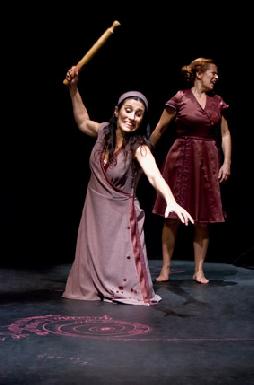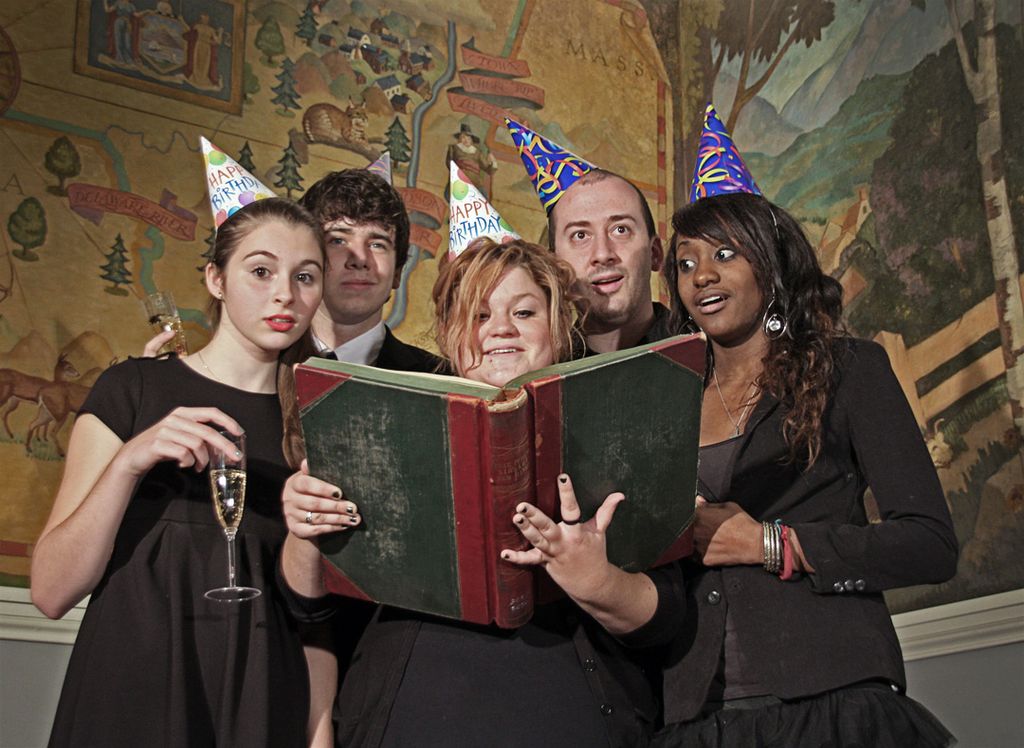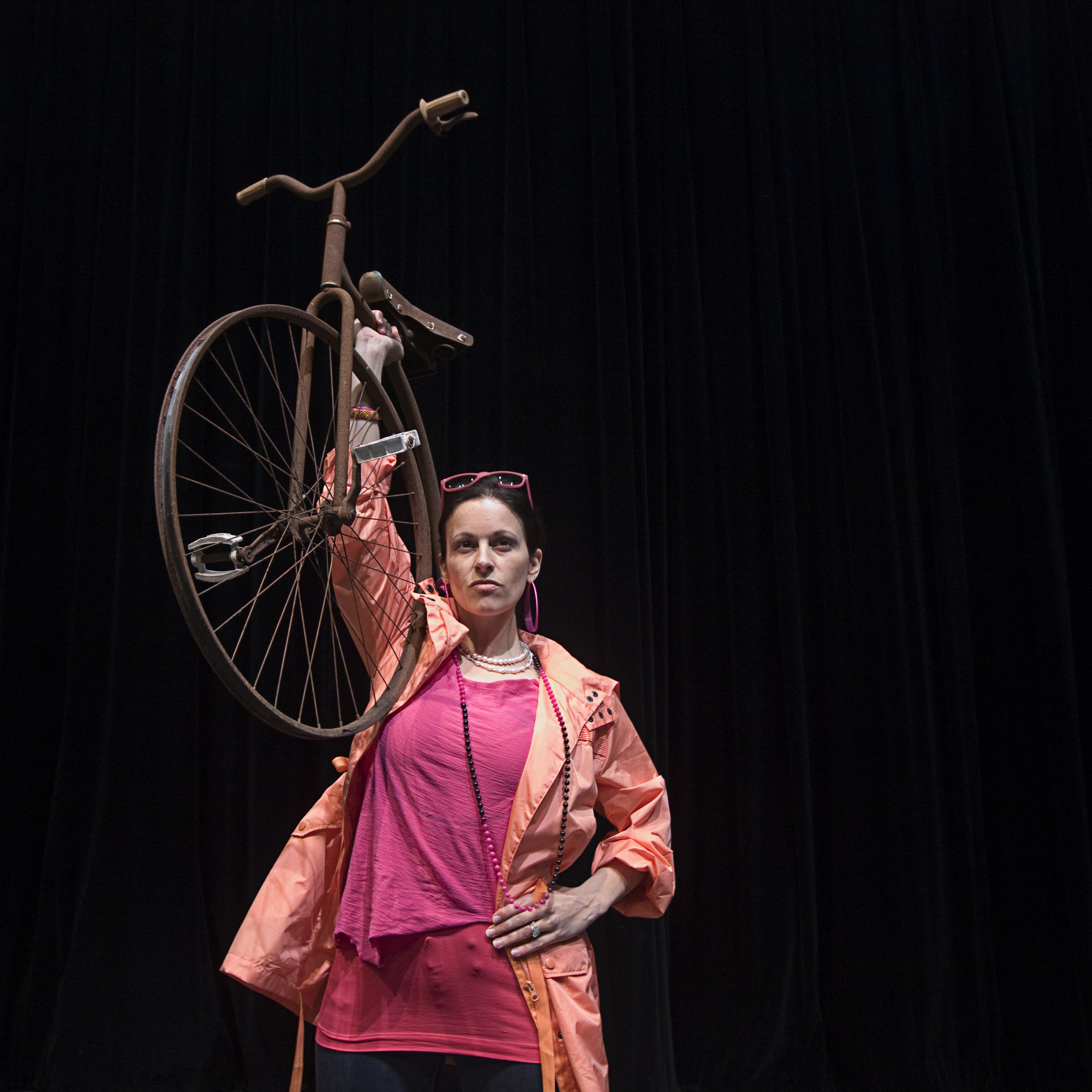The Broken Umbrella Theatre is back. After their stint as part of the Arts and Ideas Festival last year—where their show Freewheelers was one of the hottest tickets—BUT has more to live up to than ever. The troupe is known for its fresh way of incorporating facts, locations, and famous personages from New Haven history into original theatrical productions that are entertaining, educational, and inventive.

The subject of their latest production—opening tomorrow night for its first weekend run, and continuing for the next two successive weekends, through June 8—is A. C. Gilbert, the man who invented the Erector set, a build-it yourself “play set” that has turned 100. Gilbert’s toy company, originally called the Mysto Manufacturing Company when the Erector set was first developed in 1913, was one of the biggest local employers in New Haven as the A. C. Gilbert Company from 1916 and for nearly fifty years, till Gilbert’s death in 1961. According to Rachel Alderman, a producer of Gilbert the Great, Gilbert saw the idea of toys as “trinkets or baubles”—which they had been mostly—as a disservice to children. Gilbert believed that toys should be “educational, instructive, and amusing” (the claim for his Erector set), and that they should develop boys into “builders of tomorrow.” And, yes, he did mean boys. Gilbert’s ideal of manhood—the kind of guys who would fight two World Wars and return to bolster the economy through innovation and know-how—was served by his development of such “toys” as chemistry kits and an “atomic kit” that contained actual radioactive material. Gilbert wasn’t kidding around.
The breakthrough invention, though, was clearly the Erector set and so Gilbert the Great will be staged in what was once Gilbert’s factory—Erector Square, of course. The Erector set, which came in a variety of formats depending on how much money you could spare and how intricate you wanted your constructions to be, consisted of actual steel girders and could also include pulleys, caster wheels for motion and even, in the advanced kits, the means to build functional motors. Indeed, Alderman says, Gilbert, who was a noted inventor and not just a toy manufacturer, developed enamel-coated wire that made possible the creation of tiny motors, a key factor in the production of smaller appliances, such as blenders and hair dryers, and for beloved toys such as the model train. And trains are part of the story.
“One story,” Alderman says, “is that Gilbert got the idea for the Erector set while on a train into New York City when he observed the steel girders built to carry the electric lines for the train.” However, she adds, Gilbert was also savvy enough to buy up a European competitor—called Meccano—that was already on the market. Gilbert, she says, was a genius at marketing and was also skilled as a proselytizer for his products. When, during World War II shortages, there was a plan to suspend the production of such expendable items as toys, the titan of the toy industry took his argument to Congress, insisting that the toys of today build the men of tomorrow and that children need toys in order to become responsible and capable adults. It worked.
The key to Gilbert’s Erector set was the hands-on approach, and visitors to the BUT production will find in the lobby displays from the Eli Whitney Museum that inform about Gilbert’s company, including a timeline and exhibits of Erector sets. The story of Gilbert is part of New Haven history, and Alderman and her associates found, in researching and preparing the dramaturgy of the production, that many current residents of New Haven worked for Gilbert’s company, which was the first job for many now retired.
Gilbert himself is something of a character and will be played—as a character in the play—by different actors at different times. An inventor, a manufacturer, a marketer, an athlete, Gilbert was the kind of all-purpose businessman that lots of people have in mind when they talk about the American way of business. But Gilbert was also an Olympian gold medalist, in the long jump and in pole-vaulting, a graduate of Yale, and, to pay his way through college, a practicing magician. In fact, his first toy line was a magic kit for kids. Such a larger than life figure should have a play written about him.
Gilbert the Great celebrates Gilbert’s values of brainstorming, innovation, and collaboration. The play is set in 1954, the year Gilbert published his autobiography, in Gilbert’s factory where a group of workers—Betty (Lisa Daly), Morty (Ryan Gardner), Gladys (Rachel Alderman), Herb (Lou Mangini), Donald (Matthew Gaffney)—are expected to collaborate on a project. The process of their interactions and ideas mirrors the process of theater and gives the troupe the opportunity to work in certain fantastical elements, a bit of magical realism (fitting enough for a guy who was a magician), and unexpected developments. The characters, to some extent, are inspired by stories the play-writing team of Charles Alexander and Jes Mack heard from locals they interviewed about the factory in its heyday. “People will recognize the details of the story, such as parents bringing home stray pieces from sets for their children, and will be able to connect with the intergenerational experience Gilbert's industry provided," Alderman says.
Alderman calls the play “a fast-paced, whimsical and poignant” reflection on Gilbert’s legacy at a time when people are becoming wary of the passivity of children spending so much time looking at screens and foregoing the kinds of exploration and do-it-yourself, hands-on manipulation and experiential learning that Gilbert insisted was paramount for engagement with the world of things, the world we all live in.
Just at the Erector sets were not toys for small children, Gilbert the Great is not recommended for children under 7.
Special events are planned during the show’s run:
Friday, May 23, Opening Night: a special champagne toast after the show with its cast, crew and creative team
Saturday, May 31: a post-show talkback, with dessert, and discussion with Bill Brown, of the Eli Whitney Museum
Saturday, June 8, 2 p.m.: a Gilbert-inspired walking tour with guide Colin Caplan, location TBA
Directed by Ruben Ortiz, Ian Alderman, and Ryan Gardner, the show’s creation team also includes Rachel Alderman, Charles Alexander, Dana Astmann, Megan Brennan, Lisa Daly, Ian Dunn, Matthew Gaffney, Jes Mack, Louis Mangini.
A Broken Umbrella Theatre presents Gilbert the Great At Erector Square, Building 5, Floor 2 315 Peck Street, New Haven May 23-June 8 Fridays: 8 p.m.; Saturdays: 2 p.m. and 8 p.m.; Sundays: 4 p.m.











